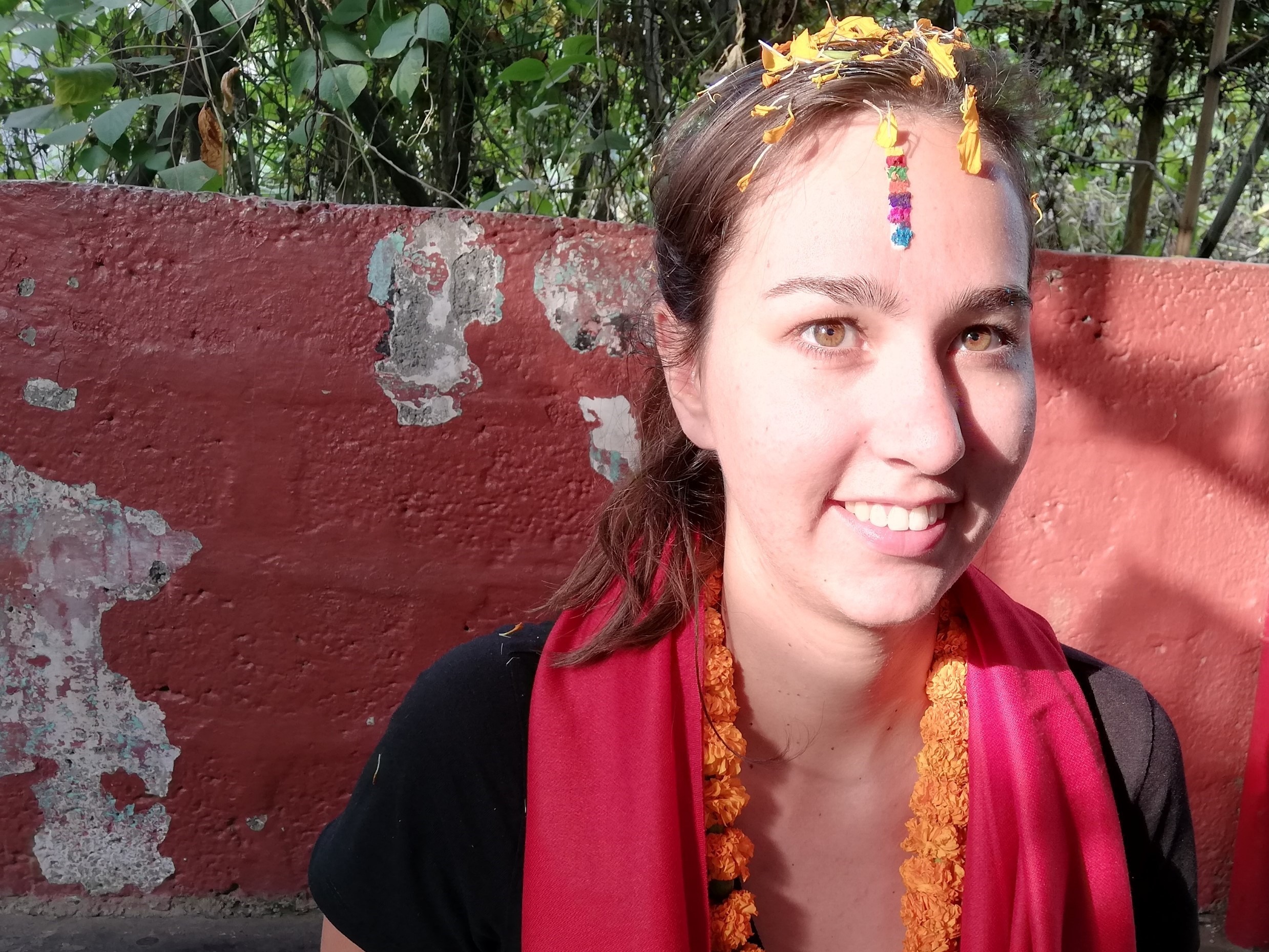Blandine Barthod Learns that 'Every Drop Counts' in the Kaski Mid-Hills.

After a sitting in front of a computer preparing IRHA’s latest Nepal project, I was excited when the plane to Kathmandu finally revved its engines and took off from Geneva airport. Landing in Nepal’s capital with my colleague Marc Sylvestre, the churn of people and vehicles was overwhelming. By the time we finally found a little restaurant and the “momos” (ravioli made with rice flour) we ordered got burned and filled the restaurant with smoke, it was clear my Nepal adventure would dramatic.
Leaving Kathmandu’s crowds behind me, I sat tensely as the bus to Pokhara lurched and wove past slower traffic, hoping the vehicle had a good brake! But as the city gave way to terraced rice paddies and rolling hills covered in sub-tropical forests, my worries were left behind. The bumpy roads along which the bus travelled had banana trees growing on them, although I occasional saw snow-capped peaks in the distance. As Nepal is so often associated with Everest and the Himalaya in the French media, it was surprising to be travelling through a semi-tropical landscape. With my image of Nepali geography quickly revised, I travelled on to meet people whose jobs were far more diverse than the Nepali-Sherpa stereotype.
After Team Kanchan greeted Marc Sylvestre and myself in the trekking town of Pokhara, we got down to work. In launching a new watershed management project, we were keen to visit the relevant catchments and meet with local authorities and community members. People told us that rainwater is a much-valued water resource, and we enjoyed hearing enthusiastic responses to our watershed management project.
Water supplies are often transported into remote villages in the mid-hills region of Nepal using solar power. This has improved the agricultural sovereignty of some farmers, But stocking rainfall locally in tanks, and carefully managing what groundwater supplies are available is still very important to ensure that rural communities can access drinking water and irrigate their crops.
Deforestation, coupled with poor water management and more intense rains during the increasingly irregular monsoon period, result in rapid surface water run-off, flash floods and soil erosion. Inter-monsoon periods with very little rainfall are increasingly common too, leading to greater aridity in the Pokhara region. So keeping rainwater within local watersheds and harvesting more rainwater for local use is key to community well-being.
Listening to local community knowledge is vital when developing an integrated water management plan. Learning from different generations of people is very important, older community members having a different relationship to their local landscape. For instance, they carry the traditional knowledge concerning how pokhari (local rainwater harvesting ponds) are created and maintained. As IRHA’s director Marc Sylvestre observed, 'You can’t restore a pokhari by lining it with cement. That’s making a swimming pool, and the water will just evaporate’. That might be the high-tech solution. But older residents in the region will tell you that buffalo were used to winnow out muddy pools, into which the water can slowly soak and then join the ground water table. This is a pokhari! This is what brings life to the Pokhara Region!
I visited Kanchan Nepal just after the monsoon. The hills were thick with luscious vegetation. But I missed seeing hog plums hanging ripe in the trees. By the time I arrived, my hosts had transformed the fruit (called lapsi in Nepali) into a sharp chutney, whose acid kick punctuated the chilli burst of the dhal bhat that I enjoyed at brunch. During such meals, it was difficult to imagine the water scarcity facing local communities during the dry season. The rains fall before the Tihar Festival, which celebrates how humans’, gods’ and animals’ lives are all interconnected. Participating in the festivities, I saw dogs and cows garlanded with marigolds, candles burning and mandalas created to honour the divine in every form.
In a region where it rains abundantly for four months, and then hardly a drop falls in the remaining eight, I saw how every drop really does count: water is precious. It is used in a very frugal manner. Most households collect and reused grey water, and women tie fabric over the ends of taps to reduce their water flow. As these women often have to carry 25 kgs of water from local springs back to their homes in baskets on their backs, I see why they are so careful with the water they have on tap. It was very humbling to witness such wise-water economy.
Towards the end of my six weeks in Nepal’s Kaski District, I accompanied Kanchan Nepal on a visit to the remote Dailekh District to see a Helvetas Integrated Water Management Project. Water scarcity remains a major issue in this remote, traditional area, where women dress in saris and wear nose rings if they are married, and internet access remains financially prohibitive. Rainfall is so scarce in this area that inhabitants have to walk for up to two hours to collect drinking water from groundwater sources. In the village of Dullu, located outside of the Helvetas project area, water is so limited that it is unthinkable to waste this precious resource on tasks like laundering bedding. When our hosts learnt that we were visiting the Helvestas project, they wanted to know all about their Integrated Water Management Plan. When it rains in Dullu, many people do not sleep, because harvesting the falling rain is so vital. Every drop truly counts. As I said goodbye to Kanchan Nepal, I knew that this motto would guide my coordination of IRHA’s Integrated Water Management Project with my Nepali colleagues.